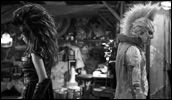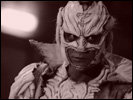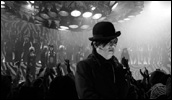Zebraman 2
- Year
- 2010
- Original title
- Zeburaman Zebura Shiti no Gyakushu
- Japanese title
- ゼブラーマン ゼブラシティの逆襲
- Alternative title
- Zebraman 2: Attack on Zebra City
- Director
- Cast
- Running time
- 106 minutes
- Published
- 1 June 2010



by Tom Mes
Takashi Miike once said that he dislikes sequels. This may seem an odd statement coming from the director of Dead or Alive 2, Crows Zero II, Part-Time Tantei 2 and now Zebraman 2. However, what he was referring to was not so much any film with a number in the title, but rather an attitude prevalent among producers to see sequels as an easy way to make a buck, instead of as proper film projects: under-funded and exploitative of their audience.
The sequels Miike has made, have on the whole been inventive, sometimes downright experimental reworkings of their originals, like re-building a house on the same plot of land with exactly the same materials and tools, but with complete disregard of the original blueprints. Perhaps even more indicative of the sincerity of his words are the sequels Miike didn't make, like the one to his J-horror hit One Missed Call, or any of the endless follow-ups to the Young Thugs (Kishiwada Shonen Gurentai) movies.
The original Zebraman (2004) was a pleasant blockbuster-wannabe that gave V-cinema star Sho Aikawa a chance at starring in a big-screen, nationwide hit. Aikawa made for an engaging and endearing lead, while the film's loving rendition of 1970s superhero nostalgia gave Zebraman both its charm and its box office potential. What's more, Miike could utilise the project's all-ages appeal to deliver a portrait of disintegrating family bonds that made this mainstream commercial movie a close cousin to the financially impoverished and notorious Visitor Q.
Where the original film cast a sympathetic eye on otakudom and childish adults, its sequel - arriving six years later no doubt due to the hectic schedules of actor Aikawa, director Miike, and scriptwriter Kankuro Kudo - explores the darker implications of adults avoiding their responsibilities in favour of pastimes they should have given up at the age of 18. Zebraman 2 is set in 2025, when Tokyo has become a totalitarian city-state renamed Zebra City, whose despotic mayor (Taka) shrewdly employs the entertainment industry and the media as propaganda tools. This is Guy Debord's society of spectacle made Orwellian flesh: the mayor's daughter Yui (Naka) is a pop star in the Britney Spears / Lady Gaga mould, who goes by the stage name Zebra Queen, has the masses at her feet, and has men salivating over her titillating videos and performances.
Into this world awakens our hero, amnesiac and white-haired, only to be gunned down mere minutes later by the mayor's death squads, the Zebra Police, who are unleashed every day for five minutes with a license to eliminate any civilian caught out on the streets. He miraculously and mysteriously survives the assault and finds himself in a refugee camp called White Horse House, where a band of severely under-equipped fellow tyranny victims plot to overthrow the mayor.
Miike and Kudo portray this totalitarian future with great intelligence and a sensitivity to certain ills that plague today's Japan in particular. The ridiculous amount of power wielded by those who create "talent" (not only within the entertainment industry but also over the mass media and beyond), the regressive tendencies of Tokyo's celebrity governor Shintaro Ishihara and his ties with that same entertainment industry, the general population's political apathy and obsession with trivial pop cultural newness, the fact that the country was until very recently essentially a one-party state - all these troubling tendencies feed Zebraman 2's vision of a future society.
Visually this is mirrored by a myriad of provocative details: the Zebra Police form part of Yui's live shows, while a special elite squad of sexy all-female bodyguards double as the starlet's mini-skirted dancers. The Zebra Queen pop videos that feature in the film were directed by Shigeaki Kubo, a seasoned vet of the medium, and the slick, professional results form a pitch-perfect part of a consistently applied aping of the visual languages of the audiovisual media, advertising, and urban design (Miike, in a trademark gesture that is equal doses modesty and mischief, is credited as genba kantoku: foreman.). With its recycled furniture and curtains blowing gently in the wind, White Horse House resembles the bright but soothing monochrome interior of a Martin Margiela flagship store, while the mayor's campaign posters look more like Pepsi ads. Meanwhile the black-and-white zebra pattern weaves through everything like a carefully monitored and applied corporate house style.
Both Miike and Kudo have come under criticism over the past years for allowing themselves to become increasingly integrated into the mainstream entertainment circuit and subsequently losing their "edge". Both men started out as marginal figures employing their unique talents to create works adored by staunchly loyal fringe audiences - audiences that carried the "edginess" of these works as a badge and means to distinguish themselves from a supposedly insipid mainstream culture.
In Miike's case - and this is something I've already outlined in my review for God's Puzzle - this perceived loss of "edginess" was merely the distant observer's lack of understanding of the profound, ongoing transformation of Japan's film industry. Miike never changed, the film industry did. This industry has become increasingly polarised, with more higher-budgeted productions that rely on formula and commercially viable concepts on the one hand, and more painfully under-funded struggling independents on the other. Today, the middle ground that spawned a film like Dead or Alive simply no longer exists. The yakuza genre has essentially become dormant once again - it certainly will never again be what it was during the 1990s. Production and distribution companies from that middle tier are going bankrupt at an alarming rate.
Yet, Miike survives and continues to make movies. Different types of movies than ten years ago, for sure. But the way he makes them hasn't changed one iota. The Miike spirit is alive and kicking, and there is no better proof of this than the frankly brilliant Zebraman 2. The director's (and the scriptwriter's) years in the mainstream jungle inform the very fabric of this film, in which he raises questions, casts doubts, expresses concern, and STILL manages to have a great time: Miike throws in playful little references to his past films as well as to Enter the Dragon and Kubrick's Clockwork Orange to name but two, while giving the up-and-coming Riisa Naka every opportunity to more than fulfill the promise of her previous performances in the likes of Café Isobe (Junkissa Isobe, 2008) and The Girl who Leapt Through Time (Toki o Kakeru Shojo, 2009). She quite convincingly steals the Show.
Even Takashi Miike's frankly disconcerting collaboration with the ultra right-wing organisations affiliated with the Yasukuni shrine, for a short anime about kamikaze pilots entitled Heiwa e no Ukei (2008, available exclusively from the shrine's gift shop), now falls into place: Zebraman 2's portrayal of the pernicious interaction between dictatorial powers and the entertainment world has arguably become the more convincing for him having had this experience - just as the director's street smarts in dealing with yakuza influences in the film world informed his depictions of those characters in his earlier films.
The Japanese film industry will continue to change. Entertainment industries worldwide are undergoing a radical transition and it is very likely that the current situation in Japan won't outlast this second decade of the millennium - if even half of that. It is, however, far more likely that Takashi Miike will continue to make films and will outlast any of the weak producers, greedy agents, disposable talent, and power-hungry politicians currently turning the film industry into a candy-coloured but foul-reeking quagmire. And that's what I call edgy.